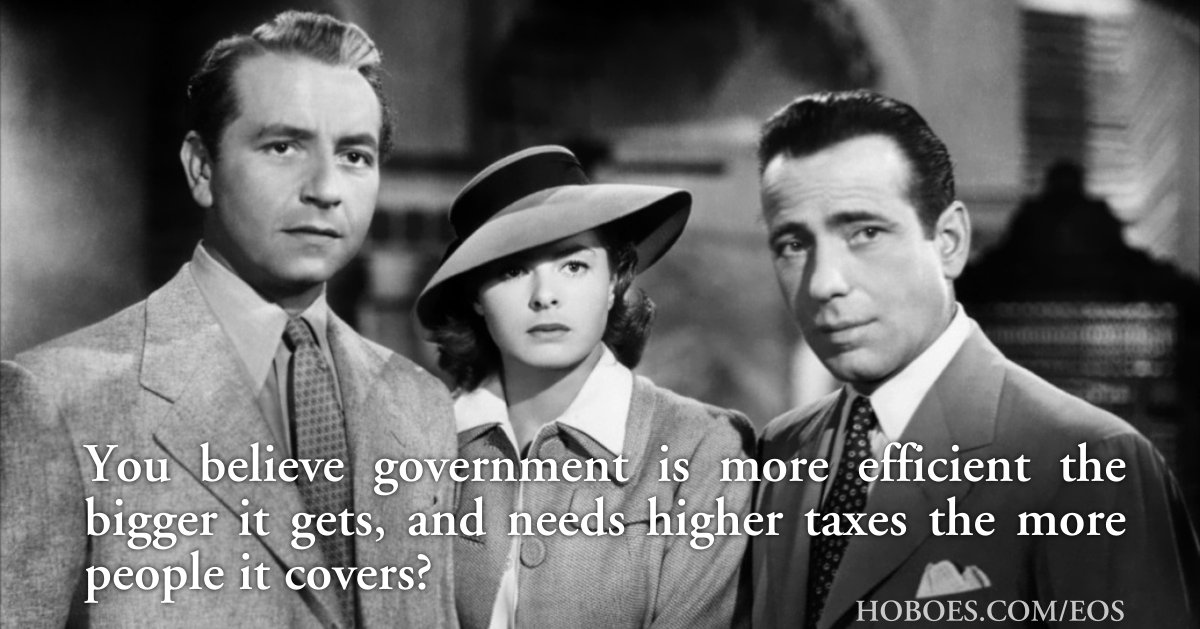Why don’t taxes go down when population goes up?

In the September 2017 Round Rock, Texas, Newsflash1, there’s an article about the property tax increase, and includes the very common rationale that the increased rate “is for additional operating costs to keep up with rising costs and growth.”
Similarly, Mitchell Schnurman writes in last Tuesday’s Dallas Morning News that “capping tax revenue poses a major threat to fast-growing cities that must invest in schools, roads, and other infrastructure.”
And in our local Community Impact newsletter, Kirby Killough, Editor, “explains” taxes2 in Why do school districts hold bond election?:
On Nov. 6 voters will consider bond proposals for Round Rock and Pflugerville ISDs. Both bonds are designed to address the strain placed on the districts by fast-paced growth in the area and provide improvements for existing facilities and equipment.
…
Districts that are experiencing rapid growth, such as Round Rock, Pflugerville and Hutto ISDs, may need to hold bond elections more often to build enough facilities to keep pace with growing student enrollments.
All cities need to invest in schools, roads, and other infrastructure. Small, large, fast-growing, slow-growing, and even shrinking.
But Round Rock and Dallas, like most Texas towns, get their budget from two sources: sales tax, and property tax. Both of these rise with inflation. Both of these rise with growth irrespective of inflation. As more people come in, more houses are built and more things are purchased.
Killough’s description of the need for increased taxes to pay for schools goes against everything the left tells us about government. If government programs are less expensive because they cover more people, then rapid growth should allow for more tax reductions and less borrowing. More people means proportionately more money, but if government is able to provide services more cheaply with more people, then they don’t need proportionately more money. They would need a smaller and smaller amount from each taxpayer the more taxpayers there are.
The left, and almost all advocates of government solutions, tell us that the government provides the best solution for their chosen problem because government enjoys an economy of scale unmatched by any competitive market.
If government enjoyed an economy of scale advantage, taxes should not have to rise when population rises. Taxes should go down, not up, during periods of growth. The faster the growth, the faster taxes should go down. Not just tax rates, but taxes themselves, should go down after adjustment for inflation.
Instead, rates go up during periods of growth to make up for growth, and then rates go up again during periods of decline to make up for the loss of taxes. It’s a one-way ratchet.
If the left were right, there isn’t even any good reason for making property taxes a rate. They should just be a set amount per property, or perhaps according to the size of the property, possibly indexed to inflation. That set amount should automatically drop every time more taxpayers moved in.
Cost of services doesn’t automatically go up just because property values rise. Nor do they automatically drop back down just because property values do.
Because of the regressive nature of property taxes, cities, at least cities run by people who believe in big government solutions, tend to run into a death spiral: taxes go up; fewer people can afford to live there; they start providing low-income housing and have to raise taxes to pay for it, so more people can’t afford to live there, most government is needed, ad infinitum. At no point is the premise, that government enjoys an economy unmatched by competition, questioned. Even worse, in order to navigate the growing bureaucratic maze of burgeoning government programs people need to hire dedicated navigators to help them determine their taxes, their property value, what they can build and who they can pay to build it, which raises costs even more.
City councils tend to complain about the restrictions put on them by the state legislature, but their incessant claim that higher taxes are necessary because of higher growth is an example of why those restrictions are needed.
On the national level, the left’s obsession with raising taxes shows that they don’t actually believe what they say about government solutions being more economical.
In response to The Bureaucracy Event Horizon: Government bureaucracy is the ultimate broken window.
It comes with the water/garbage bill.
↑Killough also writes that “Revenue from property taxes does not pay for construction projects.” which is misleading. Only charter schools are unable to “levy property taxes to pay for new construction”. For ISD schools, “local property taxes play a major role in supporting construction and renovation of school buildings”. It may be that ISD schools automatically balloon budgets to meet previous revenue that had been used for construction, but that doesn’t mean they have to. Especially if the left is right about the ability of government programs to leverage economies of scale.
↑
government inefficiency
- The Bureaucracy Event Horizon
- Government bureaucracy is the ultimate broken window.
- Economies of scale and government-run health care
- Economies of scale only produce lower prices when people are allowed a choice of service providers—including the choice to forego the service. Government-run programs do not benefit from economies of scale—in fact, scaling up will cause increased prices when the industry is run by the government.
- If the Texas Legislature won’t help solve Dallas’ problems, it should at least get out of the way: Mitchell Schnurman at The Dallas Morning-News
- The title pretty much says it all: government is the only solution, and it needs more money the more people that solution must be forced onto.
- On Austin’s $95 M Bond Proposal: James Quintero and Yash Raghuwansi at Texas Public Policy Foundation
- “The Austin city council looks like it will put a massive $925 million bond package in front of voters in November which would be ‘the largest in Austin’s history.’ If approved, the near-billion dollar proposal would raise the city’s property tax rate by another 2 cents per $100 of value, further putting the squeeze on struggling families and businesses.”
- Why do school districts hold bond elections?: Kirby Killough at Community Impact
- “Both bonds are designed to address the strain placed on the districts by fast-paced growth in the area and provide improvements for existing facilities and equipment.”
school funding
- Overview of the School Finance System at Texas Association of School Boards (PDF)
- “Local, state, and federal funds support Texas school districts, and Texas relies heavily on the local property tax to fund schools… State and federal programs help school districts pay debt service on bonded indebtedness, but local property taxes play a major role in supporting construction and renovation of school buildings.”
- Senate passes bill to help save charter schools money on construction: Julie Chang at Austin-American Statesman
- “The state Senate has cleared a bill that would help save Texas charter schools money by allowing them more state-backed construction bonds.” (Hat tip to Kim Slowey at TX Senate greenlights $100M for school construction projects)
More economies of scale
- Growth does not pay for itself
- Growth that doesn’t pay for itself is cancerous growth. It isn’t the growth of population that gets more expensive, but the expanding grasp of government.
- California never had a free market power failure
- California’s experiment in free market power generation has become mythological in how it is remembered. The left is desperate to tar it as a free market failure. But California’s experiment wasn’t free market. It was a massive government-managed exchange practically designed to cause high prices.
- Economies of scale and government-run health care
- Economies of scale only produce lower prices when people are allowed a choice of service providers—including the choice to forego the service. Government-run programs do not benefit from economies of scale—in fact, scaling up will cause increased prices when the industry is run by the government.
More government programs
- Growth does not pay for itself
- Growth that doesn’t pay for itself is cancerous growth. It isn’t the growth of population that gets more expensive, but the expanding grasp of government.
- The plexiglass highway
- Government bureaucracies can cause anything to fail, even progress.
- Please take pity on this health care orphan
- Yeah, because of a massive regulatory bill that kills job creation, young adults don’t have jobs, and because they don’t have jobs, they don’t have health insurance.
- The Bureaucracy Event Horizon
- Government bureaucracy is the ultimate broken window.
More Round Rock
- Growth does not pay for itself
- Growth that doesn’t pay for itself is cancerous growth. It isn’t the growth of population that gets more expensive, but the expanding grasp of government.
- Business prospect incentives discourage innovation
- Complicating the law and raising taxes, then lowering them for businesses that know how to lobby local or state governments, is not a recipe for encouraging innovation. It is a recipe for killing it.
- Round Rock extends dangerously low speed limits on Highway 79?
- Are accidents along Highway 79 in Round Rock the result of speed limits that are too high, or are they the result of speed limits too far below the 85th percentile?
- Round Rock, Texas: The Round Rock Public Library
- The Round Rock Public Library’s Book Nook doesn’t have many books, but what it has is quality.
- Round Rock vote to terminate Redflex contract
- Round Rock will, this coming Thursday, consider a resolution to terminate their contract with Redflex for red light cameras. I think that’s a great idea.
- One more page with the topic Round Rock, and other related pages
More runaway government
- Five Weekly Accomplishments
- Is listing five weekly accomplishments really a hardship?
- The Full Face of V: In Your Hands
- The real story in all of Moore’s books is what happens after the final page. This is most obvious in Watchmen, but every one of these books highlights an uncertain future.

